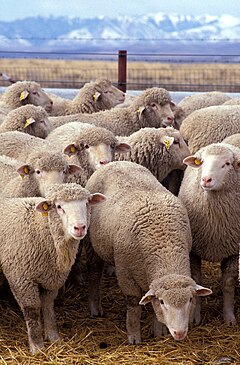
“I know my own, and my own know me.” (John 10:14)
I always have a rough time with these “sheep
& shepherd” passages. This is ironic since I’m a Welsh-American, and there
are parts of Wales where sheep are more plentiful than people. Still, having
grown up in the good ol’ USA, I don’t have much of a cultural reference for
ovine imagery.
Fortunately, however, I can always cheat
while I’m preparing sermons and go on the Working
Preacher website. This week, Professor Osvaldo Vena of the Garrett-Evangelical
Theological Seminary of Evanston, IL shared some insights about the gospel
lesson the RCL assigned for Easter 4, Year B (John 10:11-18) in which Our Lord
describes himself as “The Good Shepherd.” Professor Vena makes the rather
obvious comparison that, if Jesus is the “Good” shepherd, then there has to be
a “Bad” shepherd too. If we look at John’s gospel in the time it was written,
it’s not too hard to figure out who’s getting reamed out here.
John, the good professor reminds us, wrote
his gospel around 90 AD. This is some twenty years after the Jewish war with
Rome and the Roman destruction of the Temple of Jerusalem. During the siege of
Jerusalem, the Jewish leaders—our friends the Pharisees—high-tailed it out of
the capital to a safer location in Jamnia. Jesus, on the other hand, never
sought to save his own skin, but was obedient to the Father. He stood up to
oppression, got himself crucified, and gave his life willingly out of great love for all people. The Good Shepherd laid
down his life for the sheep. A “bad” shepherd cares more about himself than he
cares about others.
Two things impress me about this week’s lessons.
The first is the need for relationship. In verses 14 and 15 Jesus talks about
knowing and being known. Isn’t that what all of us really want? To be known by
someone for our true selves? Jesus has a relationship with his followers just as
he has a relationship with God. To me, this means that God’s people are always
called to be in relationship with each other and with the world. The Church can’t
end where our congregation’s parking lot meets the street, and our
participation in the community can’t end with sitting for an hour in the pew on
Sunday morning, politely sharing the peace of God with a handshake, and then
leaving the building without knowing the names of most of the people around us.
Like the Good Shepherd, we’re called to get to know each other and to become
invested in the well-being of others.
The other thing which strikes me here is
that Jesus isn’t condemning the theology of the “bad” shepherds, merely their
behavior. I write this because I’m having a bit of a hard time with the First
Lesson in the RCL, Acts 4:5-12. That last verse is a killer:
“There is salvation in no one else, for
there is no other name under heaven given among mortals by which we may be
saved.”
If you’re like me, you’ve always grown up
in America believing that this means, “Believe in Jesus or go to Hell.” That’s
a pretty tough position for me to take as I am preparing for a community event
to focus on neighborly kindness with the local Muslim youth center and a Jewish
educational organization. So I’m going to run for safety to this verse in the
gospel lesson:
“I have other sheep that do not belong to
this fold. I must bring them also, and they will listen to my voice. So there
will be one flock, one shepherd.” (verse16)
As one who is involved in projects with people
of a number of faiths, I certainly recognize that we don’t all belong to one
flock. That doesn’t mean, however, that we can’t share the voice of Jesus. I
just don’t want to see Jesus pictured as some sort of holy bouncer, standing
behind the velvet rope of Heaven, checking his clipboard to see whose name is
or isn’t on the guest list. If we dumb down Christianity to mean only that
those who confess Jesus are “saved”—that we have justification by correct
doctrine—than we really are missing out on the beauty of our tradition, and we’re
opening the door to be smugly prejudiced against our neighbors.
I think, rather, that as Christians we’re
called to enter into relationship with those who “do not belong to this fold,”
and to hear their voices, get to know and understand them, and to be willing to
sacrifice on their behalf as well as our own. That would be the most
Christ-like position to take, don’t you think?
I welcome your comments. May God bless you
this week.
No comments:
Post a Comment